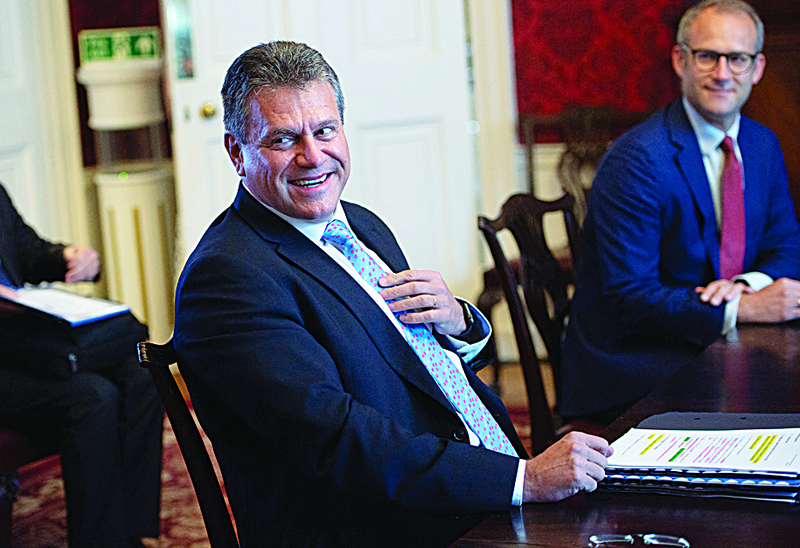 LONDON: European Commission vice-president Maros Sefcovic takes part in the first meeting of the Partnership Council followed by the eighth meeting of the Withdrawal Agreement Joint Committee in London yesterday. - AFP
LONDON: European Commission vice-president Maros Sefcovic takes part in the first meeting of the Partnership Council followed by the eighth meeting of the Withdrawal Agreement Joint Committee in London yesterday. - AFP
LONDON: The European Union yesterday warned the UK against taking further unilateral action on post-Brexit trade arrangements in Northern Ireland, promising tough measures if it does so. Visiting European Commission vice-president Maros Sefcovic said after talks with his UK counterpart David Frost that the bloc would act "swiftly, firmly and resolutely" if London broke its promise.
Meanwhile, Britain urged "flexibility" from Brussels over trading arrangements in Northern Ireland blamed for sparking violence. The EU on Tuesday warned the United Kingdom against further unilateral actions that override the so-called protocol of the divorce agreement covering the province, having already accused London of illegally breaking it.
Brexit minister David Frost co-chaired yesterday's London meeting, which covered issues including fishing, trade facilitation and law enforcement. But the key focus of the Partnership Council and Withdrawal Agreement Joint Committee, which supervises the operation of the divorce deal at a political level, was Northern Ireland.
"I hope this will be a productive forum where we can address shared challenges by working together in the spirit of mutual trust and cooperation," Frost said late Tuesday. "First among these challenges is the damaging impact the Protocol is having on the ground in Northern Ireland," he added.
"I look to the EU to show flexibility and engage with our proposals so that we can find solutions that enjoy the confidence of all communities." The EU has already launched legal proceedings against the UK after it delayed custom controls on some goods arriving in Northern Ireland from mainland Britain-England, Scotland and Wales.
Frost will meet EU vice-president Maros Sefcovic, who on Tuesday wrote in Prime Minister Boris Johnson's former newspaper the Daily Telegraph that Brussels would retaliate if Britain again extended a grace period on checks on chilled meats. The Telegraph said the threat raised the specter of a "sausage trade war" if Northern Irish shops were banned from selling British meat produce. The commission could retaliate with targeted tariffs, and it has the support of the United States, which could withhold a trade deal with London over the issue, according to an EU source.
'Time is short'
Britain officially left the EU after nearly five decades of membership in January 2020, but under the terms of the divorce, relations remained unchanged until the start of this year. Since then, London and Brussels have been trading on new terms, with the protocol effectively keeping Northern Ireland in the EU customs union and single market for goods.
The tailored arrangements are designed to sustain Northern Ireland's fragile peace, after three decades of violence over British rule largely ended in the late 1990s. But it is sowing discontent in the province, particularly among unionists, who see port checks as a threat to Northern Ireland's status as part of the UK.
The anger spilled over into violence in April as unionists rioted for several nights and pelted police with fire bombs. Frost said the "overriding shared priority" should be defending the peace process. "When I meet Maros Sefcovic later today my message will be clear: time is short and practical solutions are needed now to make the Protocol work," he said. "Further threats of legal action and trade retaliation from the EU won't make life any easier for the shopper in Strabane who can't buy their favorite product. "What is needed is pragmatism and common sense solutions to resolve the issues as they are before us. This work is important. And it is ever more urgent."
Sefcovic said there had been "numerous and fundamental gaps" in Britain's implementation of the special arrangements. He countered claims by Johnson's government that the bloc had failed to be sufficiently flexible, arguing in areas such as medicines it had allowed "tailor-made" solutions. "Far from being inflexible, the EU has shown from the very beginning that we are willing to find creative solutions when required," he said. - AFP




